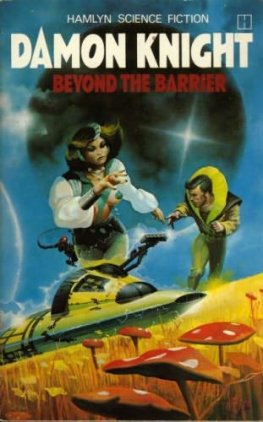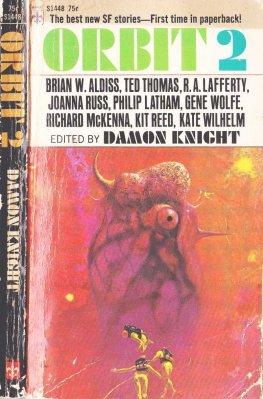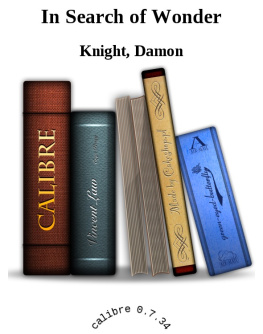Damon Knight - Orbit 20
Here you can read online Damon Knight - Orbit 20 full text of the book (entire story) in english for free. Download pdf and epub, get meaning, cover and reviews about this ebook. year: 1978, publisher: Harper & Row, genre: Science fiction. Description of the work, (preface) as well as reviews are available. Best literature library LitArk.com created for fans of good reading and offers a wide selection of genres:
Romance novel
Science fiction
Adventure
Detective
Science
History
Home and family
Prose
Art
Politics
Computer
Non-fiction
Religion
Business
Children
Humor
Choose a favorite category and find really read worthwhile books. Enjoy immersion in the world of imagination, feel the emotions of the characters or learn something new for yourself, make an fascinating discovery.

- Book:Orbit 20
- Author:
- Publisher:Harper & Row
- Genre:
- Year:1978
- ISBN:0-06-012429-6
- Rating:3 / 5
- Favourites:Add to favourites
- Your mark:
- 60
- 1
- 2
- 3
- 4
- 5
Orbit 20: summary, description and annotation
We offer to read an annotation, description, summary or preface (depends on what the author of the book "Orbit 20" wrote himself). If you haven't found the necessary information about the book — write in the comments, we will try to find it.
Orbit 20 — read online for free the complete book (whole text) full work
Below is the text of the book, divided by pages. System saving the place of the last page read, allows you to conveniently read the book "Orbit 20" online for free, without having to search again every time where you left off. Put a bookmark, and you can go to the page where you finished reading at any time.
Font size:
Interval:
Bookmark:
ORBIT 20
Edited by Damon Knight
HARPER & ROW, PUBLISHERS
New York, Hagerstown, San Francisco, London
orbit 20. Copyright 1978 by Damon Knight. All rights reserved. Printed in the United States of America. No part of this book may be used or reproduced in any manner whatsoever without written permission except in the case of brief quotations embodied in critical articles and reviews. For information address Harper & Row, Publishers, Inc., 10 East 53rd Street, New York, N.Y. 10022. Published simultaneously in Canada by Fitzhenry & Whiteside Limited, Toronto.
FIRST EDITION
isbn: 0-06-012429-6
LIBRARY OF CONGRESS CATALOG CARD NUMBER: 77-11784
Designed, by C. Linda Dingier
They Say
Like all fiction, science fiction rests on the four sturdy legs of theme, character, style, and plot. For practical purposes, it includes all stories and novels in which the strange is the dominant characteristic. Sf s particular problems result from the authors need to make this elementthe strangeacceptable to the reader.
In the broadest sense, theme is the storys central concern. In a science fiction story, for example, the theme might be the effects of a system of embalming so improved that the dead could be distinguished from the living only with difficulty. (This was the theme of my story, The Packerhaus Method, in which the chief characters father was proven dead only by the fact that he could not get his cigar to draw.) Notice that the theme has nothing to do with what happens to the characters. Theme is what the story is about.
In science fiction, it is imperative that the theme of each story be fresh or treated from a new angle: If the theme is not original or given a fresh treatment, it cannot be strange. The most commonand the most disastrouserror beginning sf writers make is to assume that editors want more stories on the same themes as the ones they have already published. The writer reads the collected works of Isaac Asimov and Jack Williamson, for example, and tries to write a robot story like theirs. His story cannot be like theirs because their stories were fresh and original when they appeared; an imitation cannot be either.
On the other hand, it is still possible to write original robot stories. In Its Very Clean, I wrote about a girl who posed as a robot because she could not find work as a human being. I like to think that was original. In Eyebem, I wrote about a robot forest ranger, and in Going to the Beach, I described an encounter with a robot streetwalker down on her luck.
The trick (and I think it one of the most difficult in writing) is to see things from a new angle. I have found three questions useful in stimulating sf story ideas.
The first is: What if something new came along? Think of something some people (not necessarily everyone) would like to have, and imagine that it has been invented. During the Vietnam War, for example, it occurred to me that the Pentagon would probably like to be able to grow soldiers in laboratory flasks. I added an almost inevitable near-future development, the unmanned, computer-controlled battle tank, and came up with a story called The HORARs of War. . . .
The second idea-generator is: What if it gets better? Take some existing art, skill, or what-you-like, and imagine that some brilliant technician is to spend his life improving it. What will it be like when he is finished? What will the social consequences of his improvements be? What if it gets better?the source of my The Packerhaus Method. A less macabre example is The Toy Theater, in which I had life-sized marionettes equipped with remote controls.
The third question: What if those two got together? Combine two existing customs, practices, sciences, or institutions. In Beech Hill, I merged the writers conference (where people who write fiction assemble) with the class of the poseur, the person whose life is his fiction. What I got was an annual gathering of those who pretend to be what they are nota secret agent, an international adventuress, a wild animal trainer, the richest man in the world, and so on. My secret agent was really a short-order cook, and he wrote the rest of the story.
The Special Problems of Science Fiction, by Gene Wolfe (The Writer, May 1976)
As a salesman, [Gerard] ONeill faithfully utters every shibboleth of the cult of progress. If we will just have the good sense to spend one hundred billion dollars on a space colony, we will thereby produce more money and more jobs, raise the standard of living, help the underdeveloped, increase freedom and opportunity, fulfill the deeper needs of the human spirit, etc., etc. If we will surrender our money, our moral independence and our judgment to someone who obviously knows better what is good for us than we do, then we may expect the entire result to be a net gain. Anyone who has listened to the arguments of the Army Corps of Engineers, the strip miners, the Defense Department or any club of boosters, will find all this dishearteningly familiar.
The correspondence between the proposed colonization of the high frontier of outer space and the opening of the American frontier is irresistible to Mr. ONeill. I find it at least as suggestive as he does, and a lot more problematical. The American prospect after, say, 1806 inspired the same sense of spatial and mental boundlessness, the same sense of limitlessness of physical resources and of human possibility, the same breathless viewing of conjectural vistas. But it is precisely here that Mr. ONeills sense of history fails. For the sake, perhaps, of convenience he sees himself and his American contemporaries as the inheritors of the frontier mentality, but not of the tragedy of that mentality. He does not speak as a Twentieth Century American, faced with the waste and ruin of his inheritance from the frontier. He speaks instead in the manner of a European of the Seventeenth and Eighteenth Centuries, privileged to see American space and wealth as conveniently distant solutions to local problems.
That is to say that, upon examination, Mr. ONeills doctrine of energy without guilt is only a renewal, in space-age terms, of an old chauvinism: in order to make up for deficiencies of materials on earth we will exploit (i. e., damage or destroy) the moon and the asteroids. This is in absolute obedience to the moral law of the frontier: humans are destructive in proportion to their supposition of abundance; if they are faced with an infinite abundance, then they will become infinitely destructive.
Wendell Berry, in The CoEvolution Quarterly, Spring 1976
I enjoyed Watership Down immensely, and read it through in two daysthats 477 pages in the Puffin edition. If a good books good, a good long books better! It is a tremendous story, and so well made, so brilliantly and yet soberly conceived and worked out, that I feel mean-minded stating any reservations or qualifications that might cool a prospective reader. And yet there is something about the book that bothers me. Im not sure what it is, but I can point to certain manifestations of it, that seem to indicate a lack of balance somewhere very deep in the conception of the work. For instanceand above allthe role of women. Women rabbits, yes, to be sure. What do doe-rabbits do? They have baby rabbits, yes, to be sure. Many jokes on the subject. Do they do anything else? Well, not in the book. They arelike women in macho thrillers or sword-and-sorceryobjects: prizes of conquest, breeding-stock. One or two rise briefly as characters, equal for a moment to the vivid male characters, but they do nothing, and soon sink back into nameless passivity. Now I wonder, first, if this is accurate observation of rabbit behavior. The female of a social species is often more adaptable, shrewder, and more inventive (imaginative) than the male, since the raising of the young is a complex social act requiring real intelligence, whereas
Font size:
Interval:
Bookmark:
Similar books «Orbit 20»
Look at similar books to Orbit 20. We have selected literature similar in name and meaning in the hope of providing readers with more options to find new, interesting, not yet read works.
Discussion, reviews of the book Orbit 20 and just readers' own opinions. Leave your comments, write what you think about the work, its meaning or the main characters. Specify what exactly you liked and what you didn't like, and why you think so.



